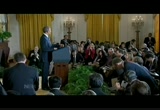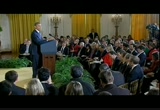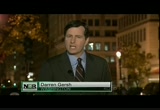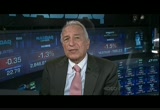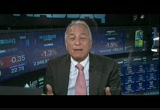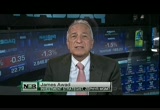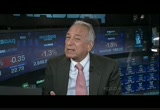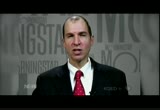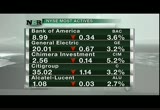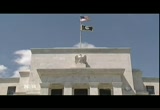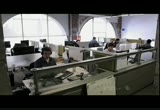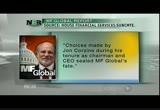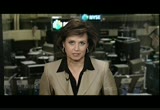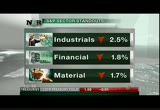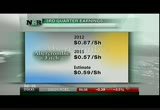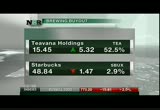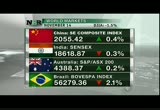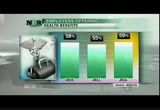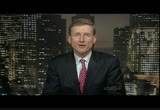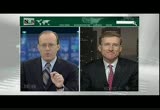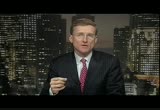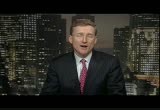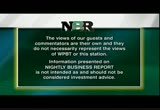tv Nightly Business Report PBS November 14, 2012 6:30pm-7:00pm PST
6:30 pm
>> this is n.b.r. >> tom: good evening. i'm tom hudson. president obama says he's open to new ideas, on raising government revenues, but eliminating tax deductions for the rich doesn't go far enough. >> susie: i'm susie gharib. stocks slide to four-month lows, on worries that a fiscal cliff deal is a still a long way off. >> tom: and with a national health care insurance overhaul underway, a company's share of health insurance has risen at its smallest pace in a decade. >> susie: that and more tonight on "n.b.r."! >> tom: with 47 days left for
6:31 pm
president obama and congress to agree on avoiding a combination of higher taxes and government spending cuts, the president today said he won't extend tax cuts for people who don't need them. that hard line came during a white house press conference just as a negotiations with republican leaders get underway to avoid the fiscal cliff. as darren gersh reports from washington, even before republicans and democrats sit down to talk on friday, both sides are laying down markers. >> reporter: just two days before he meets with congressional leaders, the president took a tougher tone on budget talks. in his news conference, he pushed hard for an immediate extension of tax cuts for everyone making less than $250,000 a year. >> and by the way, that means every american, including the wealthiest americans get a tax cut. it means that 98% of all americans, and 97% of all small businesses won't see their taxes go up a single dime. the senate has already passed a law like this. democrats in the house are ready to pass a law like this and i
6:32 pm
hope republicans in the house come on board too. >> reporter: republicans said again they would be willing to raise more tax revenue by closing loopholes or limiting deductions. but those revenues had to be matched with cuts in entitlement programs. >> until you make our entitlement programs fit the future demographic of country, the demographics of our country, you can't possibly solve our long term debt and deficit problems. >> reporter: the president did rule out some ideas today. he rejected so-called dynamic scoring which assumes some tax cuts lead to higher growth which raises tax revenues. but the president said he was keeping an open mind even as he crossed off some alternatives. >> i'm less concerned about redlines per se, i'm concerned about not finding ourselves in a situation where the wealthy aren't paying more or aren't paying as much as they should, middle class families one way or another are making up the
6:33 pm
difference-- that's the kind of status quo that's been going on here too long. >> reporter: market pros took it all in and raised their odds the president is willing to go over the fiscal cliff in january. >> there's a chance that he could blame the republicans for being obstructionist and then come back at the first of the year and get a tax bill that would exclude the top 2%. that sounds easy, but it could take several weeks in january and into february to get that done. >> reporter: the president says one of the clearest messages of the election was his pledge to raise taxes on the wealthiest americans and he gave no hints today he was ready to change that position now that he has won a second term. darren gersh, "n.b.r.," washington. >> susie: as darren mentioned, the markets took the president's comments as proof we won't be able to reach a deal and avoid the fiscal cliff, stocks on wall street tumbled: the dow fell 185 points, the nasdaq lost 37, the s&p was down 19. james awad joins us now. he's investment strategist at
6:34 pm
zephyr management. >> so, jim, what do you think investors need to hear from the president that they feel confident about investing in the markets? >> right now, there is nothing he is willing to do that would make investors comfortable. you'll notice today that the market sold off during and after his press conference because he was very aggressive in his position. and whether that's a negotiating point or not, i think what the markets fear is that we could either accidentally go over the cliff, or that all this hard posturing will set in stage a series of contractionery economic activities on the parts of businesses, in terms of not hiring, and maybe firing, and businesses shrinking rather than expanding, which will eventually find its way into consumer attitudes. so i think the market is afraid that this gun battle, or dual or chess game will lead to an
6:35 pm
accidental recession. >> susie: all right. let me follow up on that. a lot of the traders i've been talking to here feel that the president is setting up a divide. so are you saying that you see that happening? >> i think that the president feels very strongly about his position. it is something he believes in. he feels he has a mandate, whether you agree with it or not. the republicans in the house are going to find it very hard to buy into that. and i think you're going to go to brinkmanship, and the question is, do you accidentally end up in a situation where you fall off the cliff, or does that brinkmanship lead to business decisions that push us into a difficult first quarter in terms of the economy next year. so this is almost a situation where you can't hope for or root for any outcome. you have to let it play out and assess what its impact on the economy can be. but the risks right now are to the downside. the sad thing is that as we speak, the economy is
6:36 pm
actually doing pretty well. >> susie: that's good to hear. as you know, a number of very high-profile c.e.o.s are meeting with the president at the white house today, the c.e.o.s from companies like ibm and xerox and general electric. how much sway do you think these c.e.o.s have over the president? >> if he is smart, he'll listen to them. but that is not the constituenconstituency will eled him. the coalition that elected him supports his hard line on taxes as a percentage of the total package, and he has an obligation -- incidentally, i think an ideological belief that he has to go that way, and that's -- i think that raises the odds of a difficult -- a very difficult period here politically. and while he loyc listens to them and went through the theatrics of having met with them, i don't think they have a lot of
6:37 pm
influence. you're only hope is that deep down underneath people understand we have to do a deal, and the sooner the better. >> susie: just a few seconds left, how do you think that this tug-of-war is going to play out in the markets, and there are 47 days until that deadline. the dow is down 5% since the election. what kind of market performance can we expect over these next couple of weeks? >> i think corporations are in good enough shape and valuations are sensible enough that while the markets might overshoot on the downside, they would make it up reasonably quickly if we got a deal. so the short-term risks are to the downside. but i think it is all recoverable because of the underlying reasonable 2% strength in the economy. >> susie: let's hope that happens. thanks so much, james awad >> tom: still ahead, what one of the nation's biggest mutual fund companies tells investors about their portfolios and the fiscal cliff.
6:38 pm
>> susie: also weighing on investor confidence today, new questions about the fortitude of consumer spending. retail sales slid 0.3% in october, more than expected, and the first decline in three months. hurricane sandy was behind at least some of the sales decline. but there are fresh worries today about the underlying strength of the american consumer. suzanne pratt reports. >> reporter: hurricane sandy is going to get blamed a lot in the coming weeks for soft economic data. and, rightfully so. after all the superstorm paralyzed a good chunk of the northeast for at least a week. that meant, no shopping, no eating out, and no filling up the tank. >> clearly, the retail sales data were weak and they were weak across a lot of categories. the commerce dept did talk about the affects on hurricane sandy on the numbers. but, it's hard to quantify. >> reporter: the question is whether that consumer paralysis will continue into the all important holiday retail season.
6:39 pm
many economists say that really depends on whether americans feel secure in the their jobs. here's the good news: there has recently been some improvement on the labor front. on top of that, many shoppers are finding their wallets are thicker now than this time last year. >> i think the average american actually is feeling a little bit better. i think it's really based on their outlook. i think one of the things that will weigh on everyone is lower gas prices. there's also the outlook for food, commodity, gas prices, things that for everyday people are fixed costs. >> reporter: a new survey out today indicates those positive feelings may boost holiday sales, by a lot. in fact a quarter of consumers polled this past weekend said they will spend more or substantially more on gifts this year, compared to last year. but, economist mike niemera says the upbeat results came as a surprise to him. >> it may be an omen of a better
6:40 pm
season, or it may evaporate that optimism that we found very quickly as the discussion continue about the fiscal cliff. >> reporter: and, that brings up the bad news: there's still a lot of time between now and christmas in which consumers could lose those positive feelings, and spend far less than they say. suzanne pratt, "nightly business report," new york. >> tom: with the debate over taxes and government spending raging on capitol hill, businesses and the government have already slowed spending,
6:41 pm
and that could hurt any hiring plans. that's the warning today from top employment expert john challenger. he's in good company. the congressional budget office has warned if the u.s. economy goes over the fiscal cliff, unemployment next year will jump to over 9%. >> susie: hiring is also a big concern for the federal reserve. those worries could lead the central bank to extend its bond buying program to keep stimulating the economy. ruben ramirez reports from washington. >> reporter: the latest talk inside the fed is that its asset purchase plan appears to be working. fed policymakers say the strategy is helping financial markets, auto buying, and housing. that's why economist think the fed's buying spree continues into next year: >> a number of participants continue to expect that they are going to replace operation twist with straight asset purchases once operation twist expires in december. >> reporter: the fed has been buying back about $85 billion a
6:42 pm
month of long term bonds and mortgage backed securities. in minutes of its last meeting release today, fed officials, "generally agreed that a recovery in housing activity now appeared to be under way." but while it sees signs of life in the housing market, there are continuing concerns about the stubbornly high unemployment rate. late tuesday we heard from the fed's vice chair, janet yellen, she says short-term interest rates may need to stay near zero until early 2016 to spur employers to add employees to their payrolls. that's at least six months longer than currently expected. >> there's still three or four million fewer jobs than before the recession began. so that's the focus of their attention is delivering much stronger job growth. obviously to achieve that they need to achieve stronger economic growth. that means faster housing recovery, that means that their hoping that the fiscal cliff will prove to fairly benign and it will be avoided and so just generally stronger growth. >> reporter: one other topic of
6:43 pm
conversation, officials continued to debate changes to the fed's communications strategy. officials are mixed on whether to state specific levels of unemployment or inflation before they would act. ruben ramirez, "n.b.r.," washington. >> tom: it's been just over a year since brokerage firm m.f. global collapsed, and today a congressional investigation laid the blame squarely on former c.e.o. jon corzine. the house financial services subcommittee report says, "choices made by jon corzine during his tenure as chairman and c.e.o. sealed m.f. global's fate." corzine is a former new jersey governor and senator. the report says he missed warning signs of problems, leading to its bankruptcy. $1.6 billion in client money remains missing. no one has been charged with any wrongdoing.
6:44 pm
>> susie: another dent for toyota's reputation. for the second time in two months, the japanese automaker is launching a massive recall. this one involving nearly three million vehicles around the globe. this time it's a steering defect. and this recall affect's toyota's iconic hybrid name plate: the prius. 670,000 prius hybrids in the u.s. are being called back. worldwide. the voluntary recall involves over 2.7 million vehicles. the cars are being recalled because the connection between the steering wheel and the gearbox could wear out, leading to a loss of steering. so far, the company says there have been no accidents or
6:45 pm
injuries from the problem. toyota recalled over seven million vehicles for a faulty power-window switch just last month. the automaker has been trying to repair its image after a series of massive recalls, 14 million vehicles over the last several years. until recently, toyota was the role model in the auto industry for quality products. also today, toyota agreed to pay more than $25 million to settle an investor lawsuit about a 2009 recall over faulty floor mats and gas pedals. the suit accused the automaker of a lack of disclosure, surrounding unintended acceleration problems. tom, toyota stock fell on the news. >> tom: let's get going with tonight's "market focus." >> tom: the stock sell off since election day continued with the major indices sinking to four
6:46 pm
month lows. the s&p 500 looked to rebound a little at the opening bell, but the small gains vanished within the first hour of trading. the selling picked up in the afternoon with the index dropped 1.4% by the closing bell. the selling since election day has erased five percent from the market, taking it down to levels last seen in july. trading volume picked up to 827 million shares on the big board. just under 2.1 billion on the nasdaq. leading today's sell-off was the industrial sector, falling 2.5%. the financial and material sectors were down 1.8 and 1.7% respectively. all ten of the major stock sectors were down today. the sole winner among dow industrial stocks was cisco systems. the internet equipment maker fought the weak market all day thanks to its surprisingly strong quarterly financial results. shares jumped 4.8% on heavy volume. financial results from other tech bellwethers have been less than stellar, so cisco's better than expected earnings were greeted with some relief, even though it warned its european
6:47 pm
business will continue to be a drag. other big stocks in the dow, were falling hard. bank of america down 3.6%. general electric falling 3.2%. home depot was at more than a decade high yesterday. today, some profit taking, down 3%. while there were fewer buyers than sellers for most stocks, retailer abercrombie and fitch saw buyers rush in, pushing the stock up above $40 per share for the first time since may. third quarter earnings were much better than expected. abercrombie earned $.87 per share, almost 50% more than anticipated. better inventory control met fewer sales, coupled with strong sales in scandinavia and china. here's that stock pop, up 34.5%. volume soared to 16 times in average pace. the store increased its full year outlook heading into the holidays. some analysts point out the stock had a bigger than average short position, meaning traders who were betting on the stock to drop, may have been forced to buy today, adding to the rally. another stock that may have benefited from bears being force to buy was facebook. despite the threat of hundreds
6:48 pm
of millions of shares becoming eligible for trading, facebook stock it at a two week high today. volume was extremely heavy with the stock up 12.6%. it was the heaviest trading volume for facebook since its first day as a publicly traded stock. starbucks continues having a taste for tea. just before the closing bell, starbucks confirmed it will buy teavana, expanding its business beyond coffee. starbucks is the buyer, spending $620 million for teavana, based in atlanta. teavana shareholders will get $15.50 per share. teavana shares closed just a nickel below the buyout offer, up 52.5%, a five-and-a-half month high. starbucks shares fell 2.9%. it has owned the tazo tea brand for more than a decade. meantime, snack food maker diamond foods restated two years worth of financial results after the closing bell. the stock dropped 4.6% during the regular session, but fell another 17% in extended hours trading, slipping to around $16. thanks to an accounting scandal, the new financial records erased $56 million of previous profits. diamond also reported losses this year.
6:49 pm
all five of the most actively traded exchange traded products were down. the russell 2000 fund fell the most, down 1.9%. and that's tonight's "market focus." >> susie: health care insurance costs keep going up, but the increase this year was not so painful. a report out today shows the cost of offering health benefits in 2012 was up by about 4%, the smallest jump in over a decade. sylvia hall has more on that, and how businesses are managing their health insurance costs.
6:50 pm
>> reporter: the cost of providing health insurance has gone up for nearly 20 years, and that hasn't changed this year. but the cost to companies offering health insurance plans went up slowly. employers only paid 4% more in health insurance costs per worker this year, according to mercer, a consulting firm that tracks the numbers. that's the lowest increase in 15 years. the firm estimates next year's increase will be slightly higher, at 5%. the percentage of businesses offering health insurance plans also went up this year to 59%, reversing two years of decreases. >> since the health care reform law passed two years ago, employers got really serious about focusing on the management of their programs in anticipation of cost-shifting from the health care reform law. and so it really became the impetus for very bold strategies to manage their programs and what we're seeing with this lower rate of increase is that they're really paying off. >> reporter: consumer directed plans are one of the more
6:51 pm
popular strategies for businesses. they feature higher deductibles, but lower monthly premiums for workers. >> the cost of the consumer directed plan is about 20% less than your typical p.p.o. plan which you know, over half of americans that have employer- sponsored health care are enrolled in today, and so even if a few people shift into the consumer directed plan, it does create quite a nice savings for the program overall. >> reporter: but after president obama's re-election, health care reform is on more solid footing. still, that leaves plenty of unknowns, including what state health insurance exchanges will look like. states have until friday to opt in. tomorrow, we'll take a look at state-run exchanges, and some of the other factors that could change the way we pay for health care. sylvia hall, "n.b.r.," washington. >> susie: tomorrow on "n.b.r." a big day for retail earnings: walmart, target, dollar tree, and gap; all report results. and china's chooses its new diplomatic team, we look at that nation's historic once-in-a- decade leadership change.
6:52 pm
>> tom: the negotiations on avoiding the fiscal cliff will impact your paycheck, and possibly your portfolio, even if the only stocks you own are in mutual funds in a 401-k. john sweeney is executive vice president of planning and advisory services with fidelity investments. john, certainly this is a big threat for all investors, all income earners, how big is it for long-term investors? >> thanks, tom. a lot of our investors are asking us for help, trying to navigate the tacks tax landscape. and people are asking how they might adjust their portfolios. a couple of things to keep in perspective. when you think about constructing your portfolio, you want to be focused on your long-term goals. if retirement several years away, you want to make sure you have enough earnings power to outpace inflation. equities are going to play a large role in anyone's
6:53 pm
portfolio. for folks in retirement, they're obviously concerned about income in their portfolios. so we've seen a tremendous shift into fixed income over the last several years. but as people lost sight of the ability for equities to outpace the earnings power of fixed income, and we've seen that a trillion dollars has flown into bond funds, but a lot of the investors have missed out since the lows of '09. >> tom: and the s&p up about 8%, outpacing the bond return. let's talk about taxes specifically for investors. on dividends, currently 15% tax on dividends, could go as high as over 40%. capital gains, if you sell a stock with a profit, now taxed at 15%, could go as high as 20%. there is little debate that the federal government is looking for revenues, and investors are among those where they may look for those revenues. what is an investor to do? >> a couple of things to keep in mind.
6:54 pm
you mentioned mutual funds within side a tax-qualified account. so about a third of the equities are held in those tax-qualified accounts. so you don't pay taxes until you sell or take income out. a dividend is a corporation's confidence in its ability to generate earnings. when you think about a total return of a corporate balance sheet, and you think about an entity's ability to generate income, a dividend is really their confidence in that ability to generate income. so we asked investors to focus on is think about the total return power and the earnings power of that company going forward. what you might see is some companies and c.f.o.s think about changing their dividend posture. dividends have been an attractive way to increase investors and boost the stock price, but you might see them review those policies. >> tom: john, i want to get you on results of a survey you did after the election, finding only 6%
6:55 pm
of investors planned to add money to their investments. it doesn't seem like any of this debut i debate is goingo pull any of this money off the sidelines into the investment markets. >> i think people are still looking for some clarity. corporations have that same type of concern. they want to see what the consequences will be, and in the same context, you have investors wanting to see how to reapply their cash. with the thanksgiving holidays, talk with your family about some of the investments your making. i wouldn't suggest thursday, during the thanksgiving dinner, but on friday, if you have a chance to talk to your parents about their ability to sustain their retirement income, and talk to your adult children about at&t estate planning. >> tom: nothing goes better with pumpkin pie than estate planning discussions. john sweeney is with us
6:56 pm
from fidelity investments. >> susie: that's nightly business report for wednesday, november 14. have a great evening everyone, you too tom. >> tom: goodnight susie, we'll see you online at: www.nbr.com and back here tomorrow night. captioning sponsored by wpbt captioned by media access group at wgbh access.wgbh.org >> join us anytime at nbr.com. there, you'll find full episodes of the program, complete show transcripts and all the market stats. also follows us on our facebook page at bizrpt. and on twitter @bizrpt.
142 Views
Uploaded by TV Archive on

 Live Music Archive
Live Music Archive Librivox Free Audio
Librivox Free Audio Metropolitan Museum
Metropolitan Museum Cleveland Museum of Art
Cleveland Museum of Art Internet Arcade
Internet Arcade Console Living Room
Console Living Room Books to Borrow
Books to Borrow Open Library
Open Library TV News
TV News Understanding 9/11
Understanding 9/11
